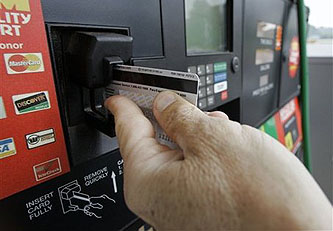While I was out yesterday, there was big news on debit card fees. Here’s how the LA Times headlined it:
Fed Reserve bans most bank overdraft fees
This caused some editorial gnashing of teeth at MoJo world headquarters, since a big chunk of my upcoming piece on the finance lobby is built around the failure of authorities to do anything about overdraft fees. In the end though, it turned out we didn’t have to do  very much aside from changing “the Fed has never done anything” to — well, I don’t want to give anything away just yet. Let’s just say the change wasn’t a big one.
very much aside from changing “the Fed has never done anything” to — well, I don’t want to give anything away just yet. Let’s just say the change wasn’t a big one.
You see, the Fed didn’t ban most overdraft fees, regardless of what the Times copy desk might think. All they did was tell banks that they have to give customers the option of whether they want overdraft protection in the first place. If they don’t, they’ll be allowed to opt out and purchases that run your account down past zero will simply be rejected.
This is, without question, a good thing. The fact that banks not only made billions of dollars by charging outrageous overdraft fees, but insisted that customers had to accept overdraft protection even if they didn’t want it (a policy put in place a few years ago as a deliberate way to make more money from their most vulnerable customers), made it almost a poster child for abusive practices. So three cheers that it’s gone.
But look: most people want overdraft protection. Banks are right about that. Unlike checkbooks of old, debit cards are marketed as routine payment devices, and since debit cards don’t have built-in check registers that warn you when your account is getting low, it’s all too easy to inadvertantly run up big overdraft charges. But the new Fed regulations do nothing about that. Under industry pressure, they ruled in 2004 that overdraft fees weren’t loans, and they still aren’t. So a $35 fee on a $17 overdraft that’s paid off in five days —and yes, this is the industry average — amounts to an APR of over 10,000%. Except it’s not an APR because it’s not a loan. It’s a “fee.”
Hogwash. It’s a small, short-term loan, just like a credit card charge. The APR should be somewhere in the neighborhood of 10-30%, like a credit card, with perhaps a small processing fee added to that. And since we live in an electronic era, that processing fee is small: maybe 50 cents or so. A dollar max.
But the Fed did nothing about that. Or about the number of fees banks can charge per day. Or about re-ordering of fees to run up total charges. Overdraft protection really is a convenience in a world where banks are doing everything they can to encourage their use even for tiny transactions, and consumers shouldn’t be required to accept usurious loan rates and sleazy hidden hustles in order to get it. Wake me up when the Fed gets around to that.

















